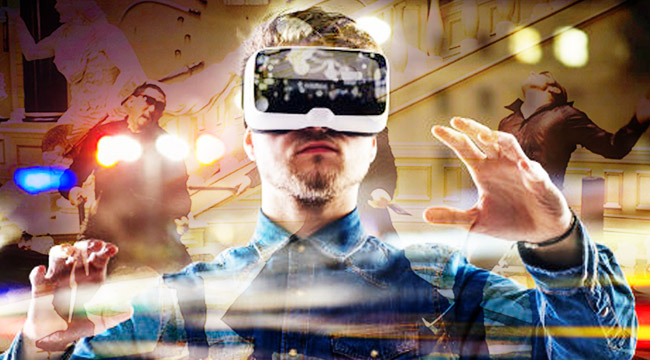
Elon Musk, the CEO of Tesla, is never shy about predicting things, and he’s not a fan of superintelligent computers. Just recently he stated that we’re basically headed toward a Matrix-like existence if we’re not living in one already, an opinion he is not alone in holding.
40 years ago we had Pong; two rectangles and a dot. Now we have photorealistic 3D simulations with millions of people playing simultaneously, and it’s getting better every year. Soon we’ll have virtual reality, augmented reality. If you assume any rate of improvement at all, then the games will become indistinguishable from reality. Even if that rate of advancement drops by a 1000, then it might happen 10,000 years in the future, which is nothing on the evolutionary scale.
In other words, if we’re capable of creating these tools, if we don’t already live in the Matrix, sooner or later we’re going to. So if we might be living in a simulation in the future, is there any chance that we’re actually living in a simulation already? And would that even matter?
Are We Living In The Matrix?
Musk is edging around what’s called the “simulation hypothesis” — first proposed in 2003 by philosopher Nick Bostrom. It essentially rests on the idea that any sufficiently advanced civilization will start creating simulations, and over time those simulations will get larger and more complex. Eventually, they will begin simulating life forms with full intelligence, and for all intents and purposes, that simulation would be reality to them. Take that theory a little further, and there’s no real way to disprove that’s not exactly what’s happening to us, that Earth and reality are a simulation created by a device we have no awareness of.
If this sounds ridiculous, keep in mind that Sony is shipping a video game that creates entire galaxies and the lifeforms that live there on the fly for the PS4 before summer’s end. So yes, we’re already doing exactly this for fun, while simultaneously arguing over whether to even bother saving our real-life biosphere if it means we’ll have to make less money.
Bostrom’s argument is more or less inductive logic. For the universe we live in to not be a simulation, one of three things has to be true: The fraction of civilizations with sufficiently advanced technology to run what amounts to the Matrix is very close to zero; the fraction of civilizations interested in running those simulations in the first place is close to zero; or if somebody, somewhere, is running a simulation it would essentially be a carbon copy of our current universe, so basically the simulation of us and the real us is interchangeable. But does this hold up?
Why We’re Probably Not Living In The Matrix
The issue, in terms of physics, is that to run a simulation so complex that it can create an entire universe and populate it with unique personalities and intelligences that include you, me, and your racist aunt, you’d need a ridiculously advanced quantum computer. It is quite literally a computer beyond human imagining at the moment. Perhaps it’s one computer for every intelligence, and it has an automated factory cranking out and networking new intelligences every time somebody gives birth. We’re not even getting into the resources it would take to power this thing, by the way.
Furthermore, there’s a problem with recursion, here. If this is a simulation, that means unless it decides to erase the whole universe at a certain point , eventually this will be a ridiculously advanced quantum computer that has simulated billions of intelligences that are building a simulation of a ridiculously advanced quantum computer. Which we, the simulations, will use to run simulations. And if those simulations are sufficiently advanced, eventually they’ll start building ridiculously advanced quantum computers to run simulations on, and those simulations will eventually build ridiculously advanced quantum computers to run simulations on… you get the idea.
We shouldn’t rule out that such a ridiculously advanced computer does, in fact, exist and that we are a simulation running on it. But it’s worth asking why any intelligence that would craft such a thing would build it in the first place. To build this would require a being with an intelligence and capabilities so vast that, by our standards, it would be God. So, like it or not, the simulation hypothesis is essentially a religious argument in science fiction robes.
If all that seems a bit too goofy and philosophical, here’s a more basic problem: Say the world is a simulation. Does that have any impact on your life at all? What we experience might be “base reality” or the result of equations firing inside a processor we will never see or understand, but they’re still our experiences. We know the rules of this simulation, if we’re in one: There are no backsies. We can’t rewind time to spend more time with loved ones who have passed away, or respawn if we get hit by a truck, or reboot a conversation and pick the option that doesn’t burn a friendship to the ground.
Perhaps life is all a simulation. Maybe we are just quantum bits flowing through a machine so complex we have no grasp of it, watched by intelligences so vast we must turn to religion to even attempt to understand them. But the joy and pain we experience is real to us and created by the decisions we make and the thought we put into them, and that’s what matters.






